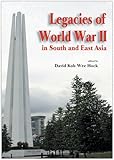Legacies of World War II in South and East Asia / ed. by David Koh.
Material type: TextPublisher: Singapore : ISEAS Publishing, [2007]Copyright date: ©2007Description: 1 online resource (230 p.)Content type:
TextPublisher: Singapore : ISEAS Publishing, [2007]Copyright date: ©2007Description: 1 online resource (230 p.)Content type: - 9789812304681
- 9789812304575
- 940.5425 22
- online - DeGruyter
| Item type | Current library | Call number | URL | Status | Notes | Barcode | |
|---|---|---|---|---|---|---|---|
 eBook
eBook
|
Biblioteca "Angelicum" Pont. Univ. S.Tommaso d'Aquino Nuvola online | online - DeGruyter (Browse shelf(Opens below)) | Online access | Not for loan (Accesso limitato) | Accesso per gli utenti autorizzati / Access for authorized users | (dgr)9789812304575 |
Frontmatter -- Contents -- Preface -- Foreword -- About the Contributors -- Part I: Overview -- 1. Opening Remarks -- 2. A Long View on the Great Asian War -- Part II: Southeast Asia -- 3. Legacies of World War II in Indochina -- 4. Transient and Enduring Legacies of World War II: The Case of Indonesia -- 5. The ‘Black-out’ Syndrome and the Ghosts of World War II: The War as a ‘Divisive Issue’ in Malaysia -- 6. The Legacies of World War II for Myanmar -- 7. World War II: Transient and Enduring Legacies for the Philippines -- 8. Singapore’s Missing War -- 9. World War II and Thailand after Sixty Years: Legacies and Latent Side Effects -- Part III: Northeast Asia and India -- 10. Remembering World War II: Legacies of the War Fought in China -- 11. How to Assess World War II in World History: One Japanese Perspective -- 12. Obstacles to European Style Historical Reconciliation between Japan and South Korea — A Practitioner’s Perspective -- 13. World War II Legacies for India -- Index
restricted access online access with authorization star
http://purl.org/coar/access_right/c_16ec
Sixty years after the end of World War II, the political and social fallout from the War is alive and divisive, as scholars in this volume show. One example is how former Japanese Prime Minister Junichiro Koizumi's visit to the Yasukuni Shrine prevented China, Japan and South Korea from sitting down together to talk about Northeast Asian integration, and wider Asian integration. Another example is the question of comfort women. Former Japanese Prime Minister Shinzo Abe's statement - that there is no evidence that Japan's government or army forced women to work in military brothels during the War - appeared to go back on a 1993 apology for the comfort women. How such issues of history are dealt with by countries of this region has an effect on contemporary relations among the major powers contending for leadership in East Asia.
Mode of access: Internet via World Wide Web.
In English.
Description based on online resource; title from PDF title page (publisher's Web site, viewed 01. Dez 2022)


